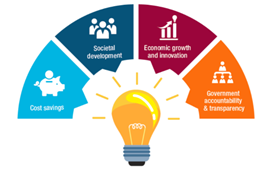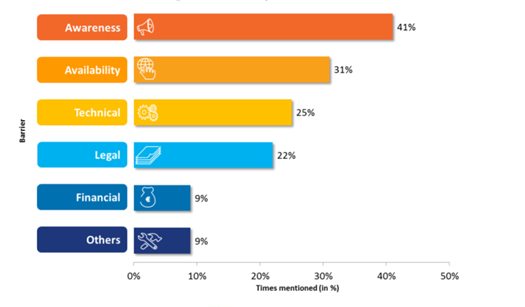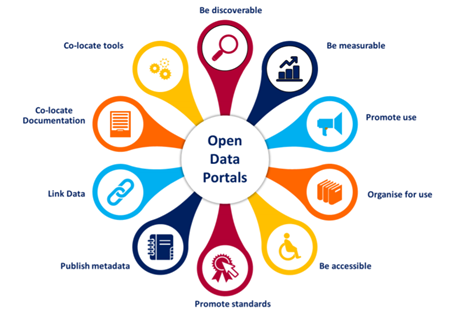Learnings from 365 days of Open Data
Learnings from 365 days of Open Data
In the last 12 months Open Data achieved more and more attention and European countries were racing to the top in terms of Open Data maturity. Numerous Open Data portals are being developed across Europe and are increasingly backed up by national policies from governments prioritising Open Data in their political agenda. This stronger focus also opened a broader research perspective. Open Data is not only about making public data available and accessible. The recent annual Open Data Day stressed the wider development and the promising potentials of Open Data for the EU, its citizens and cities. The highlights from last year's learnings show the dedication at national and local level to harness the social, political, and economic benefits of Open Data. The value and potential of Open Data reach far over the EU borders and span over sectors and fields. It tackles present challenges that citizens, cities, and countries are facing and reaches into the future to the sustainability of Open Data portals in the decades to come.
Rising Open Data Maturity

Figure 1 Open Data Maturity
The 2017 report on Open Data maturity supported the noticeable trend towards higher awareness and dedication for Open Data. European countries have been ranked in terms of Open Data readiness, assessing the span of their Open Data policies, and in terms of Open Data portal maturity. The results show that countries on average completed almost three quarters of their journey towards Open Data maturity (figure 1). The report concludes on a series of seven recommendations to guide national governments towards developing a sustainable vision for their Open Data transformation.
- Enhance your Open Data portal (1) and Sustain funding (2)
- Document the impact (3) and Interact with your users (4)
- Drive digital transformation (5), Explore privately held data (6), and Offer real-time data (7)
These recommendations aim to help facilitating the social, economic, and political benefits that Open Data holds in terms of cost savings, social development, economic growth and innovation, and government accountability and transparency.
The benefits of Open Data
The report Economic Benefit of Open Data calculates a EUR 325 billion direct market size for the period 2016-2020 and 25.000 jobs in Open Data per year. Next to the direct benefits, the intangible benefits underline the added value of Open Data in different fields, e.g. with 16% decrease in energy usage, 7.000 lives saved, and 2.549 hours saved for finding parking spots, due to quicker response, better communication, and more efficient monitoring, measuring, and decision-making.

Figure 2 Open Data benefits
Open Data in connection with emerging technologies can improve the quality of life in cities, not only in the big European metropolises. The report Open Data and Cities 2 investigates eight medium sized cities and their approach to leverage their Open Data. In connection with the rise of IoT, the possibilities to connect urban infrastructure with the city's inhabitants and their vehicles offer multiple advantages. Linking the gathered data from various sensors with public open data, e.g. on traffic and local public transport, efficiency and safety gains can be realised. More than finding parking spots quicker, autonomous driving or accident prevention can add true value to urban life, e.g. in Dublin, Florence, Gdansk, Ghent, Helsinki, Lisbon, Thessaloniki and Vilnius.
Focus on EU's neighbouring countries
Outside of the EU, the expectations regarding the beneficial outcome of making public information available are just as high. The benefits of Open Data in the EU Neighbourhood on the political and economic dimensions are highly welcomed, though there are several barriers (figure 3), the most important one still being lack of awareness. Tackling these barriers is not only advantageous for the respective country but also for the EU and its Member States. By fostering economic growth, societal development, and political stability, security can be increased at the EU borders. Quality of life, freedom, and safety can be enriched. In the future, Open Data can enable sustainable partnerships between the EU and its neighbours. This promises economic, social, and cultural benefits and supports the EU in its endeavours to decrease inequality and disparities.

Figure 3 Open Data barriers
The Future of Open Data portals
Making Open Data accessible on portals and raising awareness for its benefits is the base of promising approaches within and outside of Europe. For successful future Open Data Portals, the importance of re-use of Open Data is highlighted. Many portals are supply-driven following governmental guidelines in publishing data. To increase the impact, portals have to examine the requirements of the demand side. Ten strategies for portals were elaborated (figure 4) to understand and shape the re-use of data and better understand portal users. Since the target group becomes wider and more diverse, the task of analysing users' needs will be increasingly vital and will play an important role in helping establish more innovative products and services and truly foster Open Data impact. The sustainability of Open Data portals therefore is key, just as new and successful ways of measuring their impact. Quantifiable evidence on the impact helps to set an environment for a sustainable financial future for Open Data portals. Using existing and new approaches to get an understanding of the impact includes means of automated ongoing analysis and includes insights, methods, and metrics developed by the studies published so far.

Figure 4 10 Strategies for Open Data portals
The European Data Portal (EDP) applied these findings when updating the portal with a new dashboard, launching three new eLearning modules in five languages, publishing an updated version of the Goldbook and continuously striving to increase the numbers of data sets available. Looking into the future, the EDP will share more content in more languages making Open Data more approachable. The next challenge for the upcoming years will be raising further awareness around and measuring the impact of Open Data. Therefore, in the upcoming period there will be further research conducted on Open Data re-use and a stronger focus on the quality of data and Open Data impact. There will be deep dives into the Open Data benefits, tackling the political, social and environmental dimensions, as well as the economic benefits on both macro- and microeconomic levels. The sustainability of Open Data portals will be further researched to provide more 'best practices' on innovative Open Data approaches and their implementation.
All in all, we look back at a content-rich year of Open Data and a great year ahead! We invite you to stay tuned and embark in the new Open Data year together with the European Data Portal!
